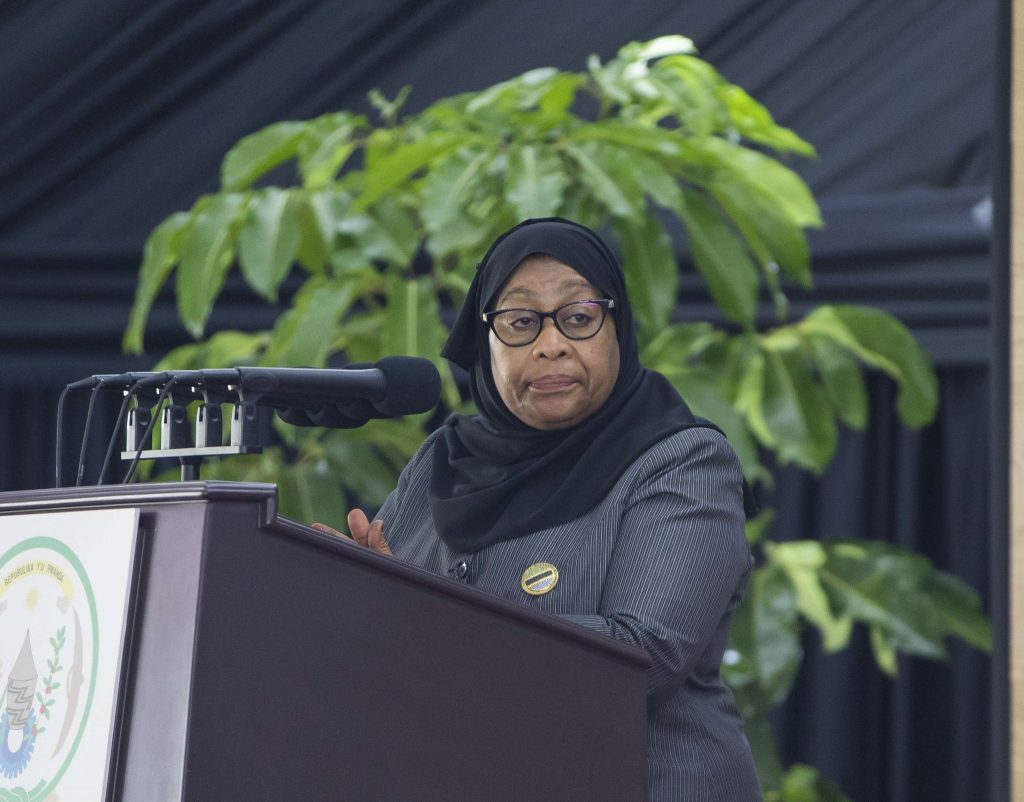Tanzania’s New President: Lack of Assertiveness or False Promises?
Six months ago, on March 19, 2021, Samia Suluhu Hassan succeeded her predecessor, John Magufuli, as President of Tanzania, following his unexpected death. While the country initially hoped for a decisive political turnaround, many now fear a relapse into Magufuli’s authoritarian regime.
Samia Suluhu Hassan was promoted from the vice-presidency after announcing the sudden death of John Magufuli on March 17, 2021. Officially, his death was caused by heart complications, rejecting rumors that he died of COVID-19 – a disease he had previously denied.
Tanzania under Magufuli witnessed largescale infrastructure projects but also significant restrictions on freedoms and opposition rights. The overall score on political transformation in Tanzania peaked at 6.85 in the 2008 BTI, then dropped significantly and has not recovered since. The BTI country report indicates further autocratic tendencies since Magufuli became president in October 2015. It identifies particularly problematic developments regarding “the government’s repression of political opposition, civil society representatives, media and ordinary citizens” as well as the handling of the COVID-19 pandemic. Electoral fraud and a deliberate undermining of the separation of powers by the late president in recent years added to that negative trend.
Hassan’s inauguration was accompanied by hopes for change, because she indicated that she intended to deviate from Magufuli’s course in several areas. Her origin from the partly autonomous Zanzibar and the fact that she was not a member of Magufuli’s inner circle raised expectations for a more democratic leadership style.
What conclusions can be drawn from her first six months in office? Three developments stand out in particular.
Managing the COVID-19 Pandemic
Samia Suluhu Hassan managed to achieve an important turning point in the country’s approach to COVID-19. Previously, Magufuli had played down the virus. He had stopped reporting case numbers and called for prayer and steam baths instead of masks and vaccines.
Unlike her predecessor, Hassan takes the pandemic seriously. Three weeks after taking office, she announced plans to set up a national COVID-19 task force to enhance the government’s public health measures and improve communication with the public. Hassan promoted social distancing and the use of masks and urged the citizens to get vaccinated. She received her first jab on July 28, 2021 and published the first data on coronavirus in more than a year in June 2021, confirming 100 cases since the beginning of the third wave.
In doing so, Hassan appears to be breaking with the policy of her late predecessor and changing course on COVID-19.
Regional and International Relations
Apart from pledging her country’s strengthened cooperation with the international community concerning COVID-19, President Hassan also expressed plans to improve Tanzania’s international and regional relations in general. Previously, Magufuli isolated his country internationally, and, according to the BTI, international cooperation in Tanzania has steadily deteriorated since recording began in 2006, dropping from a score of 8.7 in the BTI 2006 to 6.0 in the BTI 2020.
Hassan took several measures to strengthen ties with direct neighbors and other African countries. By making official visits to Uganda, Kenya, and Rwanda, she signaled her intent to improve relations between the countries, which had earlier been strained under Magufuli’s leadership. Hassan also attended a Southern African Development Community (SADC) summit in Mozambique to show she is serious about improving relations with SADC countries in southern Africa.
Even beyond the region, Hassan worked on improving Tanzania’s reputation internationally and reviewing the country’s foreign policy. At the beginning of her term, she chose the former ambassador to the US, Liberata Mulamula, as the new foreign minister, assuming her diplomatic experience would improve dialogue with international partners. She also called on foreign direct investment and demanded taxes, immigration, and business licenses to be made more attractive to foreign investors. To promote Tanzania abroad and attract potential investors, Hassan brought an international filming crew to shoot a documentary about the country, which will be launched on the US market and showcased worldwide.
So far, no particular focus can be identified in her global orientation, as Hassan spoke with various international leaders. For instance, she held telephone talks with Chinese President Xi Jinping and agreed to strengthen bilateral ties between the two countries. President Xi promised to open China’s market for Tanzanian products and increase Chinese investment in Tanzania’s industrial sector. Further, Hassan had a video meeting with EU Council leader, Charles Michel, to discuss the COVID-19 pandemic and cement existing relations. She also had a phone call with German chancellor Angela Merkel to discuss bilateral cooperation, regional policy issues, and the impact of the Corona pandemic on Africa.
Her involvement to date indicates a significant change from Magufuli’s international isolation and gives hope for a stronger outward orientation in the future as well.
Domestic Politics
Hassan is not only striving for change when it comes to international orientation, but also domestically. The lifting of restrictions on freedom of the press and freedom of expression at the beginning of her term of office can be understood as the start of a turning point. While Magufuli’s authoritarian regime banned critical media and censored coverage of sensitive government information, the political temperature cooled down when Hassan lifted media bans, released political prisoners, and expressed her wish to reach out and talk with the opposition. A significant political move was the appointment of ruling Chama Cha Mapinduzi (CCM) party loyalists and some new people, including former opposition members, as district commissioners, to build unity for the country.
Yet, recent developments raise doubts about her initial promises. President Hassan suspended two newspapers in less than a month, which she accused of false stories. Firstly, the Uhuru newspaper, owned by the CCM party, was suspended for 14 days for saying that Hassan would not vie for office in 2025. Secondly, Raia Mwema, a leading weekly in Swahili-language, was suspended for 30 days after linking a gunman who killed four people in a rampage in Dar es Salaam to the ruling CCM party.
Additionally, the arrest of prominent opposition leader Freeman Mbowe on terrorism-related charges in July 2021 brings back memories of the methods practiced by Magufuli. Mbowe claimed his constitutional rights were violated during his arrest and explained that the charges were politically motivated to crush dissent. This reinforces the concern that Hassan is a hostage of the system and cannot separate herself from the practices of her predecessor.
However, it is crucial to consider that Samia Suluhu Hassan is still constrained by the ruling CCM party, which remains much the same party as under President Magufuli, leaving her little room to maneuver. Launching an audit procedure against the CCM party newspaper could also mark her personal strength. Opposition members disagree whether the regressive forces of the establishment and the CCM restrain Hassan from pursuing democratic reforms or whether she is willingly picking up where the Magufuli era ended. Thus, the case of Mbowe will be a test of whether or not President Hassan will break with Magufuli’s authoritarian governing style or not.
Taking Stock of Hassan’s First Months in Office
Initial hopes for a political change of direction in Tanzania, were vindicated by Hassan’s change of course in combating the COVID-19 pandemic and her altered approach to regional and international relations. However, her early attempts to promote freedom of expression and the press were questioned after she temporarily suspended newspapers and opposition leader Mbowe was arrested. Although she may have sincere intentions to improve the political situation in Tanzania, she needs to position herself more strongly to go against the system and the ruling party.


Thanks for the information and very useful 🙂
Thank you for this great article, updating on the transition from Magufuli to Hassan rule. Would be valuable to have an additional update now that we approach 2 years of Hassan in office.